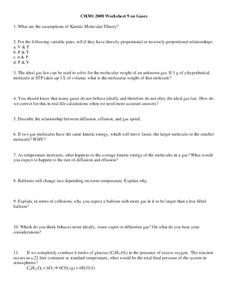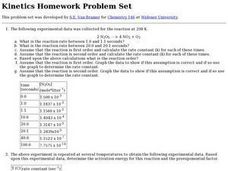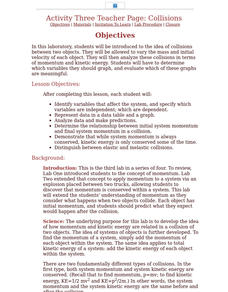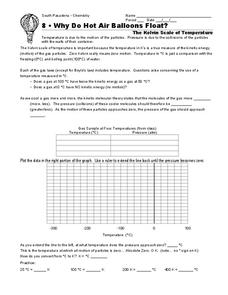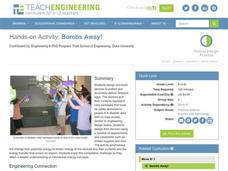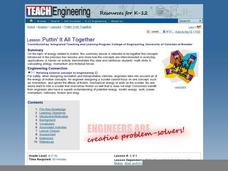Curated OER
Gases
In this gases worksheet, students review the kinetic molecular theory and use the ideal gas law to solve 20 problems.
Curated OER
DOWNHILL DISCOVERIES
Students studykinetic energy, friction, drag and acceleration by relating it to the Winter Olympics. In this physical properties lesson students create tracks and determine how the course conditions affect bobsled, luge and downhill ski...
Curated OER
Kinetics Homework Problem Set
In this chemistry worksheet, learners determine the reaction rate as specified for each in seconds. Then they determine the activation energy for the reaction and preexponential factor as stated. Students also determine the concentration...
Curated OER
A Potential Energy Worksheet
In this energy worksheet, students describe the differences between kinetic and potential energy and the difference between heat and temperature. This worksheet has 6 short answer questions.
Curated OER
Energy
In this energy worksheet, students complete a graphic organizer by fill in the different types of energy and the different forms of energy.
Curated OER
Activity Three Teacher Page: Collisions
Students after completing this lesson plan, identify variables that affect the system, and specify which variables are independent; which are dependent. They represent data in a data table and a graph and analyze data and make predictions.
Curated OER
Heating/Cooling Curve
For this heating and cooling curve worksheet, learners use a given graph of a substance being heated from a solid to a liquid and then a gas over time. They use the graph to answer eleven questions about the phases of the substance and...
Curated OER
Why Do Hot Air Balloons Float?
In this gases worksheet, students read about the Kelvin scale of temperature, they answer 3 fill in the blank questions about the relationship between temperature and pressure and they plot the temperature and pressure of gas samples at...
Curated OER
Bombs Away!
Students design and build a device to protect and accurately deliver a dropped egg. They review and study a number of vocabulary words that are associated with this lesson. They work in a small group in order to develop a successful...
Curated OER
Reaction Kinetics and Rate Laws
In this reaction kinetics worksheet, students draw a graph of energy vs. reaction progress and determine the factors which change the speed of a reaction. Students learn about rate laws. This worksheet has 1 graph, 15 fill in the blanks,...
Curated OER
Magnetic Energy
In this magnetic energy worksheet, students are given the formula to calculate the magnetic energy of an object. They use the formula to solve for the magnetic energy of the Earth, a geotail, the Sun, and a solar prominence given their...
Curated OER
Energy Changes, Rates of Reactions, Nuclear Chemistry
In this energy changes, rates of reactions and nuclear chemistry instructional activity, high schoolers solve 14 problems to review concepts about endothermic and exothermic reactions, heat of combustion, heat of reactions, enthalpy,...
Curated OER
Energy
Young scholars distinguish between kinetic an potential energy. They recognize that energy is conserved when changing from one form to another. Students compare the scientific meaning of work with its everyday meaning.
Curated OER
Transformations of Energy
Seventh graders investigate the relationship between energy and matter, and measure the mass of various objects. They listen to a teacher-led lecture about potential energy, and in small groups measure the mass of various objects such...
Curated OER
Student Exploration: Energy Conversions
In this earthquake exploration worksheet, students complete 3 prior knowledge questions, then use "Energy Conversions Gizmo" to conduct several activities, completing short answer questions when finished.
Curated OER
Balls and Ramp
Students role several balls of different weights down a ramp and into a paper cup and record how far each ball made the paper cup move. They then answer questions that help them analyze their results and reinforce the idea that energy...
Curated OER
What is Energy?
Students define energy and identify the different types that exist. They identify places they see, hear or feel energy. They understand the role of engineering in finding and testing sources of energy for the production of electricity.
Curated OER
Puttin' It All Together
Students explain the concepts of kinetic and potential energy and how it can change forms. For this energy, motion, and frictional forces lesson students participate in a hands on activity that includes calculating energy.
Curated OER
Forms of Energy
Students, working in expert groups, study a form of energy. They plan a slide show presentation using pictures, clip art, and student taken digital pictures that show the energy type they have become experts in. They use a planning sheet...
Curated OER
Nuclear Reactions: Fission and Fusion
These nicely designed slides work through the processes of nucelar fission and fusion with very clear, labeled diagrams that almost act as animations when you progress from slide to slide. Facts behind the process are summarized well....
Curated OER
Home Energy Audit: Energy Worksheet
In this energy instructional activity, students compare work and energy, determine which situations require the greater amount of work, and explain kinetic and potential energy. This instructional activity has 4 short answer questions...
Curated OER
Science Word Search
For this science worksheet, students locate and identify various vocabulary terms related to earth science. There are 44 words/phrases located in the puzzle.
It's About Time
States of Matter: Solid, Liquid, and Gas
Solid, liquid, and gas: they all matter. Scholars create an animation of the various states of matter, experiment with the temperature of water as it changes states, and observe carbon dioxide as it changes states. The lesson also...
Cornell University
Friction
Friction and gravity are always at odds! Learners complete a set of activities to explore the relationship between friction and gravity. Groups make conclusions about the factors that affect the amount and type of friction between surfaces.


